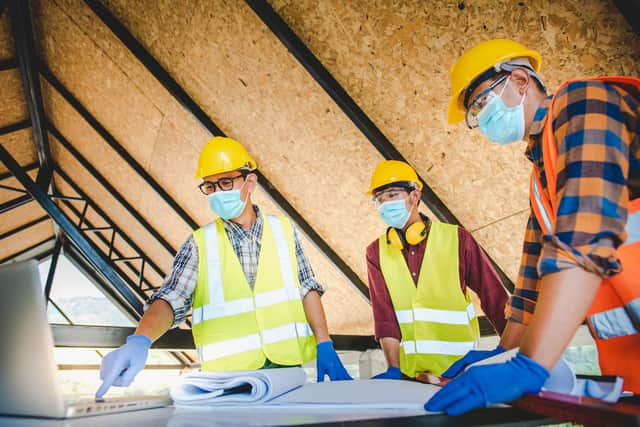Can construction sites stay open in Scotland lockdown? New Covid restrictions for non essential work explained


Since June 2020, construction workers have been able to return to work, while many other sectors have been forced to furlough staff and ask people to work from home due to coronavirus restrictions.
Speaking at a briefing on 13 January, First Minister Nicola Sturgeon announced tightened restrictions for non-essential work in Scotland, and she had previously hinted that these would impact construction workers.
Advertisement
Hide AdAdvertisement
Hide AdSo, can construction sites remain open under the tougher restrictions? This is what we know.
Can construction sites remain open?
Yes, construction sites will remain open since workers on these sites cannot work from home.
Sturgeon’s tougher restrictions impact click and collect businesses, takeaway services, and alcohol consumption. She has also made it a legal obligation for employers to allow staff to work from home if possible.
The only guidance that could impact construction workers are the tougher restrictions for those who work indoors. Guidance was already in place to allow tradesmen in Tier 4 areas to work in private dwellings, and only if it is essential for the upkeep, maintenance and functioning of the household, but this guidance will now become law.
Construction workers must adhere to the latest advice on coronavirus restrictions and regulations - including wearing PPE and avoiding car sharing if possible.
Following Nicola Sturgeon’s statement on 13 January, during which she outlined the further restrictions, Construction Scotland also updated guidance to support construction companies and workers.
Ken Gillespie, a member of the Scottish Construction Leadership Forum Executive Group, said: “We are once again at a critical stage in controlling the virus and whilst we know that the vaccine is on its way there are tough weeks ahead and it is all of our responsibilities to play our part in stopping the spread.
“The relevant guidance is available to all. Please go now and review it for your workplace, reinforce messages to all team members and take whatever steps are necessary to make it as safe as it practically can be.”
What new safety regulations must workers adhere to?
Advertisement
Hide AdAdvertisement
Hide AdConstruction Scotland has advised there will be stricter reinforcement of current Scottish legislation.
This includes stricter management of ‘Toolbox Talks’ to avoid close contact, minimising car sharing, home working where possible, increased ventilation, greater use of face coverings and stricter cleaning.
Scottish government restrictions include keeping a 2 metre distance from other workers, unless working as part of a group.
Restrictions also include that you must wash your hands and surfaces regularly, and stay home and alert your manager if you have any coronavirus symptoms.
Mr Gillespie stressed the need for workers to comply, stating: “The new variant of the virus spreads more easily, so all the rules in place to protect you, your family and your community are more important than ever before.
“Recognising the new variant and the understanding of aerosol transmission between people inside at greater than 2m distance, the industry safe operating guidance has been strengthened and it is essential that everyone working in construction should revisit this guidance.”
Should construction workers in the vulnerable category continue working?
No, people who identify as vulnerable should not go to work.
Advertisement
Hide AdAdvertisement
Hide AdThis includes those who are in the higher risk categories such as: older men, black and ethic minority groups, people with diabetes or other health conditions impacted by the virus and those with a higher BMI.
Anyone who is unable to work will be kept on the extended furlough scheme by their employer.
Those who are self-employed and who filed tax returns in 2018/2019 and 2019/2020 should claim Self-Employment Income Support Scheme (SEISS) grants.
Workers who have been able to continue working, but at a reduced rate due to coronavirus restrictions, can also claim loss of profit through SEISS.